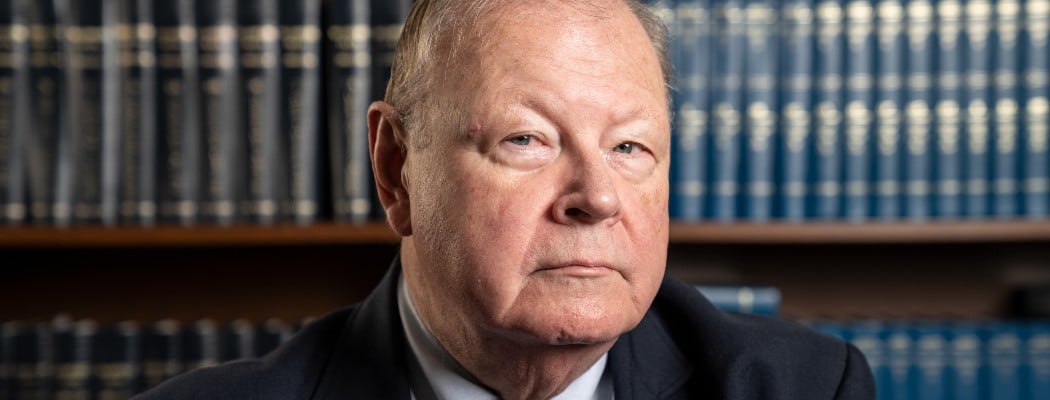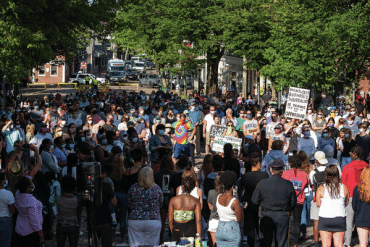The rare genius of Nantucket lawyer Arthur Reade.
The story of local attorney Arthur Reade is of a man both blessed and cursed with intellectual capabilities far beyond those of most mortal men. A respected pillar of Nantucket’s legal world, Reade is known for his wit and wisdom; however, there is far more to his story than people know.
 Accepted to Harvard College at the age of thirteen, Reade was the youngest member of his class and then went on to graduate from George Washington University Law School at the age of nineteen. Modest and unassuming, Reade had an unconventional childhood of which few on Nantucket are aware. Reade was born in Weymouth, Massachusetts, to a Swiss mother and American father, and it became very clear at an early age that he was no ordinary child. At the age of three, he would sit on his grandfather’s lap as they read The Wall Street Journal together. By the time he was school-age, Reade was already a voracious reader and could be seen in kindergarten perusing the Christian Science Monitor at recess. It was at this point the school decided he belonged in a higher grade.
Accepted to Harvard College at the age of thirteen, Reade was the youngest member of his class and then went on to graduate from George Washington University Law School at the age of nineteen. Modest and unassuming, Reade had an unconventional childhood of which few on Nantucket are aware. Reade was born in Weymouth, Massachusetts, to a Swiss mother and American father, and it became very clear at an early age that he was no ordinary child. At the age of three, he would sit on his grandfather’s lap as they read The Wall Street Journal together. By the time he was school-age, Reade was already a voracious reader and could be seen in kindergarten perusing the Christian Science Monitor at recess. It was at this point the school decided he belonged in a higher grade.
Reade recalls with dry sarcasm, “My mother, observing this situation correctly or incorrectly, determined that I was obviously the most intelligent human being that ever lived, and met with the director of instruction at the Weymouth Public Schools.” Reade was put in first grade for a week, then second grade for a week, and finally settled in third grade at the age of six. From there he skipped sixth grade and ultimately completed four years of high school in three. Reade applied to Harvard College and was accepted at the tender age of thirteen. Reade’s mother steered her son away from sports and other conventional childhood activities in favor of academics, an approach that perhaps denied him some of childhood’s more special moments.
When asked how he had fit in both emotionally and physically with students significantly older than he was, Reade looked back fondly on the friends he had made during his four years at Harvard. As gifted as he was, he did acknowledge that Harvard was a lot tougher than Weymouth High School and his routine of getting all A’s in all grades came to an end during his college years.
Despite having to work for his grades for the first time in his life, he became very active in college life, most notably in the Harvard Young Republican Club where he was secretary. For all his positive experiences in college, Reade wistfully acknowledged that sending a boy to college at an early age perhaps deprived him of benefits that maturity can provide.
In 1959 at the age of seventeen, Reade graduated cum laude from Harvard College but was denied access to Harvard Law School because of his youth. Initially, Reade attended Boston University Law School but his interest in politics drew him to George Washington University Law School, where he also spent time working on Capitol Hill. Not surprisingly, when it came time for Reade to take the bar exam, not only did he pass but the Massachusetts Board of Bar Overseers sent him a letter saying that he had tied with another test taker for the highest score at that time.
A man with a galloping curiosity, Reade found himself bored in the last two years of law school and became fascinated with horse racing. His biggest interest was in breeding. “I can tell you the pedigrees of many horses, including a lot that were active back in the late sixties and seventies. I was always interested in buying fillies and improving their catalog page and then reselling them.” Reade put together a number of small syndicates and won a stakes race at Hollywood Park in California, as well as several other minor stakes races.
Reade’s segue to Nantucket came while working at a small law office outside of Boston in the early seventies. He became involved in litigation related to the Windswept Cranberry Bog, which was being litigated in probate court in Nantucket. Reade’s colleague became familiar with several people on Nantucket and asked if he would come down to meet them for legal representation. “I had never been on Nantucket before and arrived on the island in early spring of 1973,” he said. “One thing led to another and I started picking up more and more clients until 1982 when I became involved in a real estate matter that consumed a significant amount of my time. I moved to Nantucket full time in 1985 and here I sit.”
 A true Renaissance man with no limits in terms of the breadth of his interests, Reade developed a fascination with fine wines. “I was buying wine faster than I could drink it, which is the definition of a collector. I started buying a lot of Bordeaux back in the eighties and there were some very good vintages then.” Reade added, “Nowadays, I just buy wine that I want to drink in the relatively near future.”
A true Renaissance man with no limits in terms of the breadth of his interests, Reade developed a fascination with fine wines. “I was buying wine faster than I could drink it, which is the definition of a collector. I started buying a lot of Bordeaux back in the eighties and there were some very good vintages then.” Reade added, “Nowadays, I just buy wine that I want to drink in the relatively near future.”
From horse racing to oenology, Reade also developed a fascination with ornithology. He would go on expeditions in search of specific species and on Nantucket would enjoy bird life in his own backyard. Reade also developed a taste for German and Italian baroque choral music among his many pursuits. “I can’t read a note and I certainly can’t sing a note, but I spend a great deal of time going to concerts, particularly those of early baroque music,” he said.
When asked for his observations regarding changes on Nantucket and the explosion of wealth on the island, Reade posed his own questions: “Was the quality of life better in the good old days than it is today? Were the good old days the good old days or just the old days?” He added, “None of us were around when Nantucket was impoverished, which was the latter part of the 19th century which is when tourism took hold on the island. I think that the quality of life on Nantucket, by and large, is high; however, people at the bottom of the socioeconomic scale here really do have a hard time.”
When asked whether he is an optimist about Nantucket’s future, Reade said, “I’m definitely an optimist. People are always saying how bad things are on the island. Nantucket is always a better place than anywhere else and I think that situation will continue.”







